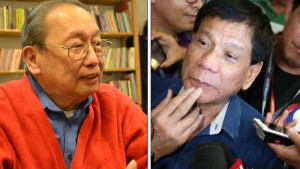
Communist Party of the Philippines (CPP) founder Jose Maria Sison and Davao City Mayor Rodrigo Duterte. FILE PHOTOS
DAVAO CITY-Incoming President Rodrigo Duterte has announced he will issue a safe conduct pass to exiled communist leader Jose Maria Sison so he could return to the country and join the peace talks.
“I will be, at that time, President, and I will give him (Sison) a safe conduct pass and also to those inside prison like the Tiamsons (Benito and Wilma) because they have to participate in the peace talks,” Duterte said in a press briefing late Saturday evening here.
Duterte said he would ask Silvestre Bello, whom he earlier appointed as chief peace negotiator with the National Democratic Front of the Philippines, and presidential adviser to the peace process Jesus Dureza, to hold a preliminary dialogue with Sison in Oslo.
“I have commissioned them to go to Oslo…to go there for the framework and agenda that they will talk about,” Duterte said.
He said Bello and Dureza could also “accompany, maybe, Jose Maria Sison to go home.”
Duterte said if both parties, in their preliminary talks, could hammer out an initial agreement, “then I will release all the political prisoners.”
The president-elect said he would do everything he has said, “(a)s long as I am satisfied that the agreement would enhance and not jeopardize the Republic of the Philippines and eventually a plus factor in our lives.”
Human rights group Karapatan has documented at least 543 political prisoners, including 18 NDF consultants, all over the country.
Out of the 543 political prisoners, 88 are sick while 48 are elderly.
Duterte earlier said the confidence has been high between the two parties, saying he had no other agenda in pursuing the talks other then resolving the conflict.
In the Hague Joint Declaration in 1992, both parties agreed to tackle substantive agenda including human rights and international humanitarian law, socio-economic reforms, political and constitutional reforms, end of hostilities and disposition of forces.
In March 1998, both parties signed the Comprehensive Agreement on Respect for Human Rights and International Humanitarian Law (CARHRIHL).
The government and the NDF panels have already formulated their drafts for the Comprehensive Agreement on Socio-Economic Reforms (Caser) but the process has not made any progress after the talks hit a snag. SFM